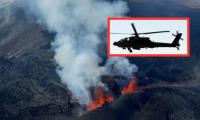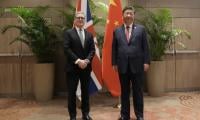Foreign envoys eye ‘small window’ to end Ethiopia war
Foreign envoys were scrambling on Tuesday to end Ethiopia’s year-long war, hoping a push led by the African Union can stop the conflict before a feared rebel march on the capital.
Jeffrey Feltman, US special envoy for the Horn of Africa, held a late-night meeting on Monday with his AU counterpart, former Nigerian president Olusegun Obasanjo, the State Department said.
"We believe there is a small window of opening to work with (Obasanjo)," spokesman Ned Price told reporters in Washington. Last week Feltman met top Ethiopian officials before travelling to Kenya to see President Uhuru Kenyatta, who has been closely involved in regional mediation efforts.
"We have engaged with the TPLF as well," Price said, referring to the Tigray People’s Liberation Front rebel group. "We are engaging with the parties to try and put them on a path to a cessation of hostilities."
The UN has also tried to rally support for Obasanjo’s initiative to end a conflict that has killed thousands of people, displaced two million and inflicted atrocities and starvation on civilians.
UN emergency relief coordinator Martin Griffiths on Tuesday called for peace following a weekend visit to Tigray’s regional capital Mekele where he met with TPLF leaders. "I implore all parties to heed the UN Secretary-General’s appeal to immediately end hostilities without preconditions, and reiterate the (UN’s) full support" for Obasanjo’s efforts, he said.
Briefing the AU’s 15-member security body on Monday, Obasanjo expressed optimism that progress was in the offing.
"All these leaders here in Addis Ababa and in the north agree individually that the differences opposing them are political and require political solution through dialogue," he said, according to a copy of his statement seen by AFP. "This, therefore, constitutes a window of opportunity that we can collectively tap."
Campaign group Human Rights Watch urged the AU and the UN to "move beyond discussions". "It’s critical for African leaders and UN Security Council members to work together to take immediate action to avert further atrocities -- or they will have failed the Ethiopian people," said HRW executive director Kenneth Roth.
The TPLF and its allies, the Oromo Liberation Army (OLA), have claimed several victories in recent weeks, taking towns about 400 kilometres (250 miles) from the capital, and they have not ruled out marching on Addis Ababa.
The government says the rebels are greatly exaggerating their gains but has declared a nationwide state of emergency and ordered the capital to prepare to defend itself. Much of the conflict-affected zone is under a communications blackout and access for journalists is restricted, making battlefield claims difficult to verify.
Nevertheless, a number of countries have urged their citizens to leave Ethiopia while commercial flights are still available. The US embassy has also ordered its non-essential staff to leave and the UN has suspended non-essential missions to Addis Ababa.
Britain on Tuesday advised its nationals to "leave Ethiopia while commercial routes are available", citing a deteriorating security situation. "The conflict has potential to escalate and spread quickly and with little warning," the advisory said.
Among African nations, Zambia repatriated 31 workers from its embassy in Addis Ababa, following an order by President Hakainde Hichilema to evacuate its citizens. Prime Minister Abiy Ahmed sent troops into Tigray in November 2020 to topple the TPLF, the former regional ruling party that dominated national politics before Abiy took over in 2018. Abiy, winner of the 2019 Nobel Peace Prize, promised a swift victory, but by June the TPLF had retaken most of Tigray before expanding into the neighbouring regions of Amhara and Afar.
-
 Prince Harry Mentions Ex-girlfriend Chelsy Davy In UK Court
Prince Harry Mentions Ex-girlfriend Chelsy Davy In UK Court -
 David, Victoria Beckham 'quietly' Consulting Advisers After Brooklyn Remarks: 'Weighing Every Move'
David, Victoria Beckham 'quietly' Consulting Advisers After Brooklyn Remarks: 'Weighing Every Move' -
 Meta's New AI Team Delivered First Key Models
Meta's New AI Team Delivered First Key Models -
 Prince Harry Defends Friends In London Court
Prince Harry Defends Friends In London Court -
 AI May Replace Researchers Before Engineers Or Sales
AI May Replace Researchers Before Engineers Or Sales -
 Christina Haack Goes On Romantic Getaway: See With Whom
Christina Haack Goes On Romantic Getaway: See With Whom -
 Consumers Spend More On AI And Utility Apps Than Mobile Games: Report
Consumers Spend More On AI And Utility Apps Than Mobile Games: Report -
 Aircraft Tragedy: Missing Tourist Helicopter Found Near Japan Volcano Crater
Aircraft Tragedy: Missing Tourist Helicopter Found Near Japan Volcano Crater -
 Taylor Swift Lands In Trouble After Blake Lively Texts Unsealed
Taylor Swift Lands In Trouble After Blake Lively Texts Unsealed -
 'Prince Harry Sees A Lot Of Himself In Brooklyn Beckham'
'Prince Harry Sees A Lot Of Himself In Brooklyn Beckham' -
 Kate Middleton’s Cancer Journey Strengthens Her Commitment To Helping Children
Kate Middleton’s Cancer Journey Strengthens Her Commitment To Helping Children -
 Gaten Matarazzo Compares 'Stranger Things' Ending To 'Lord Of The Rings'
Gaten Matarazzo Compares 'Stranger Things' Ending To 'Lord Of The Rings' -
 Prince Harry Slams Publisher Over 'dirty Trick' Ahead Of Showing Evidence
Prince Harry Slams Publisher Over 'dirty Trick' Ahead Of Showing Evidence -
 Blueface Promises To Change Behaviour If His Ex Comes Back
Blueface Promises To Change Behaviour If His Ex Comes Back -
 Prince Harry Makes Crucial Promise To Meghan Markle Over UK Return
Prince Harry Makes Crucial Promise To Meghan Markle Over UK Return -
 Keir Starmer’s China Visit: UK Follows Mark Carney In Major Reset Of Ties
Keir Starmer’s China Visit: UK Follows Mark Carney In Major Reset Of Ties



